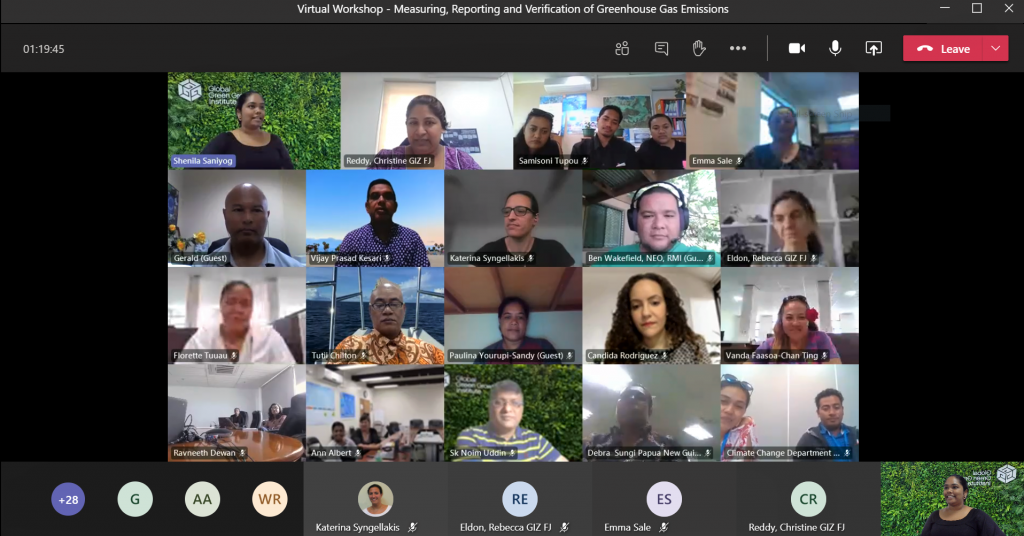
Participants signed in virtually to be part of the MRV of GHG emissions training.
The Regional Pacific Nationally Determined Contribution (NDC) Hub held a three-day virtual capacity-building training on measurement, reporting and verification (MRV) of greenhouse gas (GHG) emissions for its Pacific Government counterparts from 27 – 29 October 2020.
The Global Green Growth Institute (GGGI), recognizing the importance of country requests and the need for an MRV training, coordinated this training workshop as part of its role as an implementation partner of the Regional Pacific NDC Hub. Hosted virtually, the workshop garnered an impressive participation of over 70+ participants from around the Pacific region.
The training focused on enhancement of local capacities for collecting, reporting and retention of GHG emissions data to support national reporting, using tailored methodologies and measurement systems, and understanding the institutional and governance settings associated with MRV of GHG emissions.
Opening the virtual workshop, the Regional Pacific NDC Hub Steering Committee Chair, Mr. Tutii Chilton said the MRV of GHG emissions could play an important role in setting sector-specific baseline and targets of GHG emissions, assisting countries to benefit from enhancing its NDC mitigation and adaptation ambitions.
“Measuring, reporting and verification of greenhouse gases refers to estimating, reporting and verifying actual carbon emissions equivalent over a defined period of time, which is also embedded under Article 13 of the Paris Agreement”, said Mr. Chilton.
“This is particularly useful for us in the Pacific as we have high mitigation and adaptation ambitions and this workshop arrives at an opportune time as it will lay the groundwork for equipping our teams working on NDCs to be informed about MRV processes and requirements under the Paris Agreement and beyond”, he said.
The Regional Pacific NDC Hub Project Manager, Mr. Christian Görg from GIZ said the workshop was a direct response by the Regional Pacific NDC Hub to its member countries request for an MRV capacity building training earlier in 2020.
“These important activities are only possible due to the strong collaboration between regional and international organizations working on climate action coming together to share their expertise, and the generous financial support provided by the Germany, New Zealand, Australia and United Kingdom Governments that enable for such workshops to happen”, said Mr. Görg.
Mr. Nelson Kalo, Principal Scientific Officer Mitigation for Vanuatu Climate Change Department, acknowledged the value as countries shared their experiences during the country intervention sessions and demonstrated “how each country could learn from each other to build up and strengthen their MRV systems in-country”.
Ms. Aradhana Singh, Climate Change Officer Mitigation for Fiji’s Climate Change Division echoed this statement, saying there was a definite “need for a coordinated, integrated and systematic approach to set up a GHG Inventory MRV system”. The Fiji Ministry of Economy also moderated an important session during the workshop and shared their experience with participants.
Coordinated by GGGI’s Senior Officer, MRV and NDC Enhancement, Dr. Noim Uddin, the workshop was delivered through collaboration with the Climate Action and Inclusive Development division of GGGI, Secretariat of the Pacific Regional Environment Programme (SPREP), Deutsche Gesellschaft fur Internationale Zusammenarbeit (GIZ), Pacific Community (SPC), United Nations Development Programme (UNDP), the Ministry of Primary Industries of New Zealand, the Department of Industry, Science, Energy and Resources of the Australian Government, Mitsubishi UFJ Research and Consulting (MURC), AECOM (New Zealand), Ekos (New Zealand) and the Ministry of Economy of Fiji.